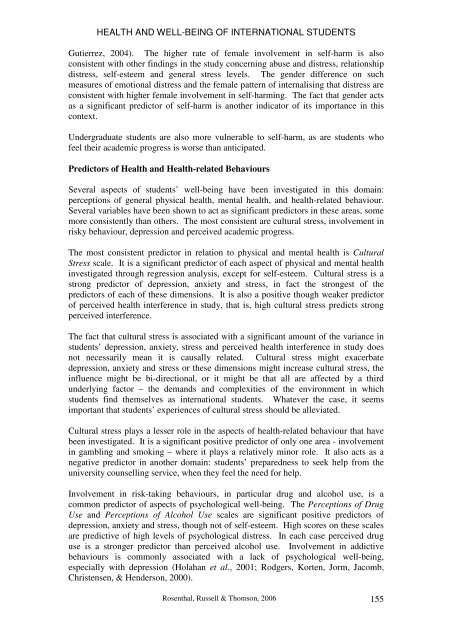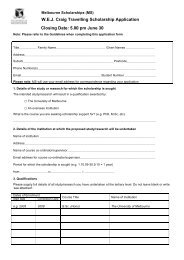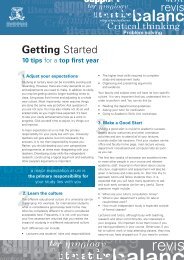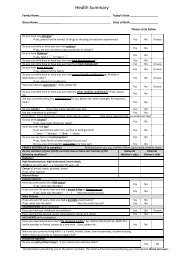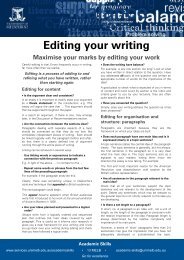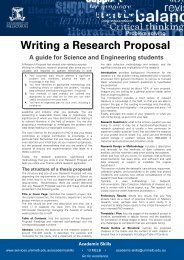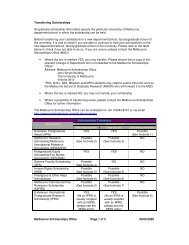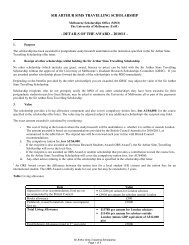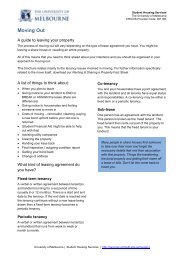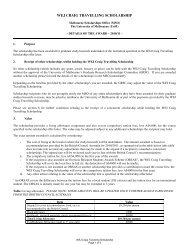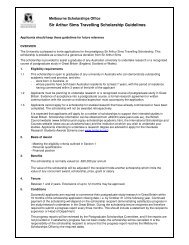a growing experience - Student Services - University of Melbourne
a growing experience - Student Services - University of Melbourne
a growing experience - Student Services - University of Melbourne
You also want an ePaper? Increase the reach of your titles
YUMPU automatically turns print PDFs into web optimized ePapers that Google loves.
HEALTH AND WELL-BEING OF INTERNATIONAL STUDENTSGutierrez, 2004). The higher rate <strong>of</strong> female involvement in self-harm is alsoconsistent with other findings in the study concerning abuse and distress, relationshipdistress, self-esteem and general stress levels. The gender difference on suchmeasures <strong>of</strong> emotional distress and the female pattern <strong>of</strong> internalising that distress areconsistent with higher female involvement in self-harming. The fact that gender actsas a significant predictor <strong>of</strong> self-harm is another indicator <strong>of</strong> its importance in thiscontext.Undergraduate students are also more vulnerable to self-harm, as are students wh<strong>of</strong>eel their academic progress is worse than anticipated.Predictors <strong>of</strong> Health and Health-related BehavioursSeveral aspects <strong>of</strong> students’ well-being have been investigated in this domain:perceptions <strong>of</strong> general physical health, mental health, and health-related behaviour.Several variables have been shown to act as significant predictors in these areas, somemore consistently than others. The most consistent are cultural stress, involvement inrisky behaviour, depression and perceived academic progress.The most consistent predictor in relation to physical and mental health is CulturalStress scale. It is a significant predictor <strong>of</strong> each aspect <strong>of</strong> physical and mental healthinvestigated through regression analysis, except for self-esteem. Cultural stress is astrong predictor <strong>of</strong> depression, anxiety and stress, in fact the strongest <strong>of</strong> thepredictors <strong>of</strong> each <strong>of</strong> these dimensions. It is also a positive though weaker predictor<strong>of</strong> perceived health interference in study, that is, high cultural stress predicts strongperceived interference.The fact that cultural stress is associated with a significant amount <strong>of</strong> the variance instudents’ depression, anxiety, stress and perceived health interference in study doesnot necessarily mean it is causally related. Cultural stress might exacerbatedepression, anxiety and stress or these dimensions might increase cultural stress, theinfluence might be bi-directional, or it might be that all are affected by a thirdunderlying factor – the demands and complexities <strong>of</strong> the environment in whichstudents find themselves as international students. Whatever the case, it seemsimportant that students’ <strong>experience</strong>s <strong>of</strong> cultural stress should be alleviated.Cultural stress plays a lesser role in the aspects <strong>of</strong> health-related behaviour that havebeen investigated. It is a significant positive predictor <strong>of</strong> only one area - involvementin gambling and smoking – where it plays a relatively minor role. It also acts as anegative predictor in another domain: students’ preparedness to seek help from theuniversity counselling service, when they feel the need for help.Involvement in risk-taking behaviours, in particular drug and alcohol use, is acommon predictor <strong>of</strong> aspects <strong>of</strong> psychological well-being. The Perceptions <strong>of</strong> DrugUse and Perceptions <strong>of</strong> Alcohol Use scales are significant positive predictors <strong>of</strong>depression, anxiety and stress, though not <strong>of</strong> self-esteem. High scores on these scalesare predictive <strong>of</strong> high levels <strong>of</strong> psychological distress. In each case perceived druguse is a stronger predictor than perceived alcohol use. Involvement in addictivebehaviours is commonly associated with a lack <strong>of</strong> psychological well-being,especially with depression (Holahan et al., 2001; Rodgers, Korten, Jorm, Jacomb,Christensen, & Henderson, 2000).Rosenthal, Russell & Thomson, 2006 155


